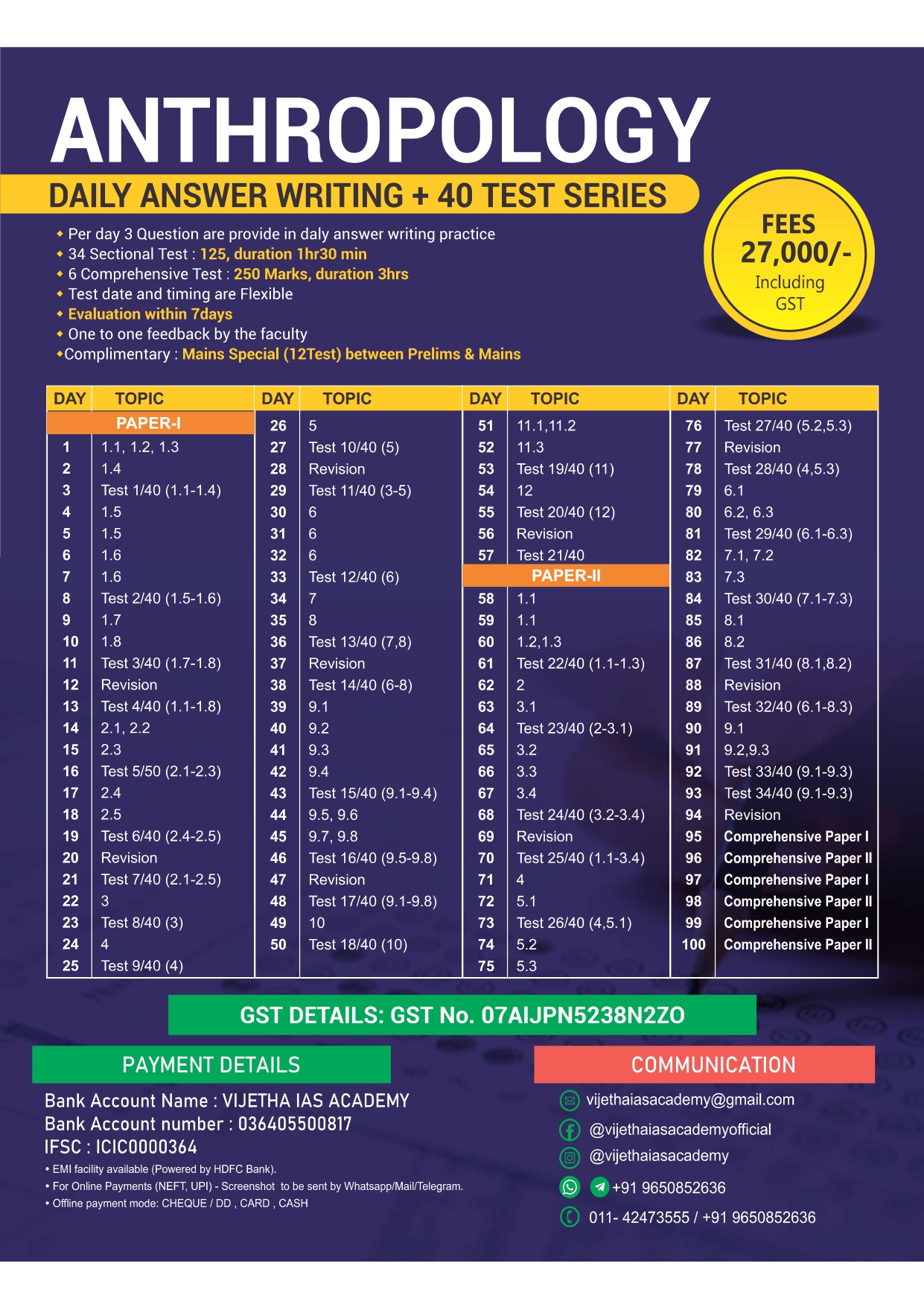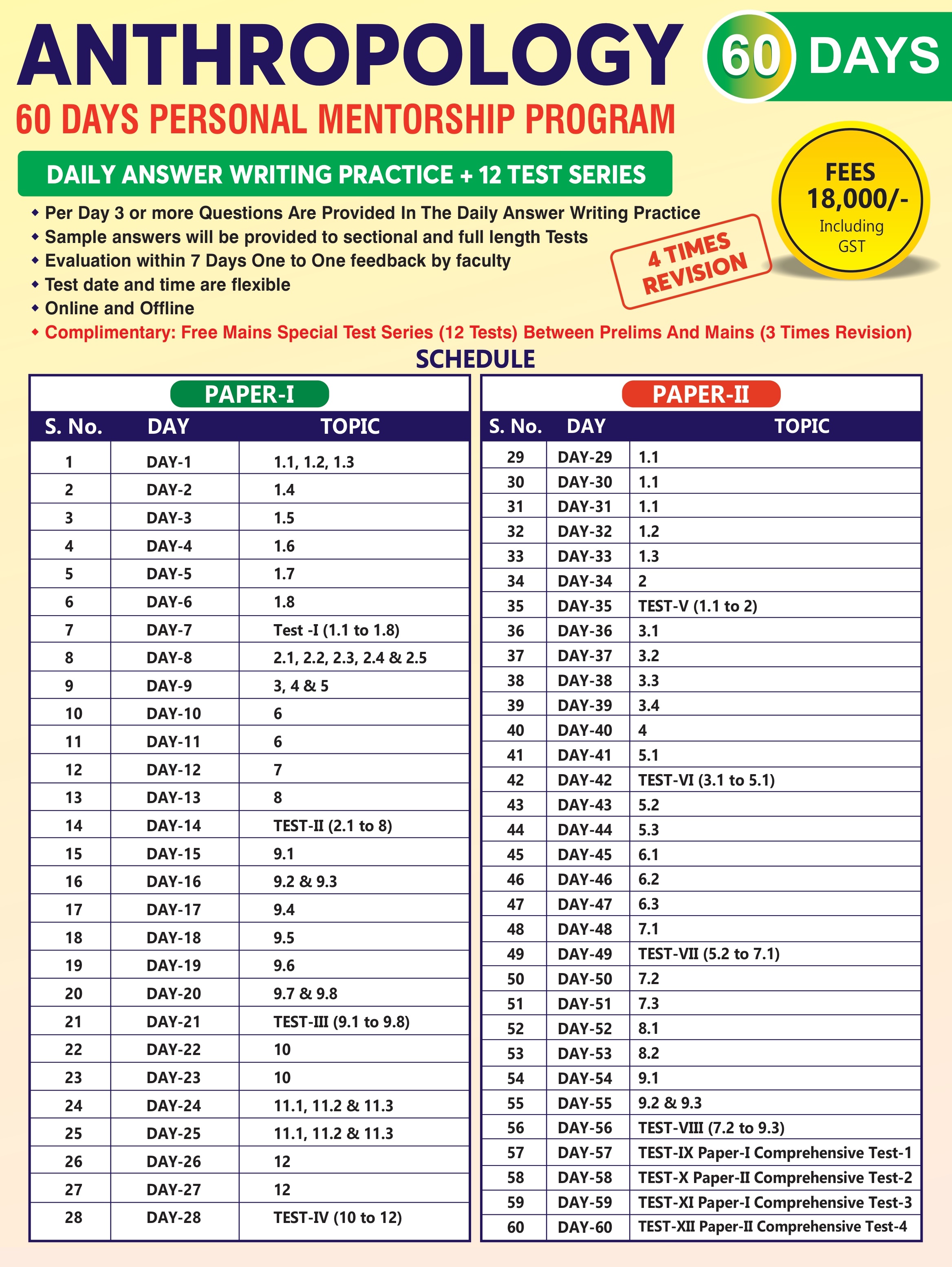
Critically describe evidences from Rakhi Garhi and its linkages to Harappan civilization.
(20 Marks) Anthropology Optional Paper CSE 2024
Introduction
Rakhigarhi, located in the Hisar district of Haryana, is one of the largest and most significant sites of the Indus Valley Civilization (IVC), also known as the Harappan Civilization. This ancient settlement, spanning an area of approximately 350 hectares, is believed to have been a major urban center. The discoveries at Rakhigarhi have provided crucial insights into the Harappan way of life, urban planning, and cultural practices, offering fresh perspectives on the chronology and geographical spread of the civilization. This site has been linked to the Harappan urban network, further illuminating the interconnectedness of cities across the region.
Main Body
Excavations and Findings at Rakhigarhi:
Urban Planning and Architecture: The excavations at Rakhigarhi have revealed a well-planned city with a sophisticated layout, similar to other prominent Harappan sites such as Mohenjo-Daro and Harappa. Evidence of a grid pattern of streets, large houses, and drainage systems has been found, demonstrating advanced knowledge of urban planning and civil engineering.
Pottery and Artifacts: A rich variety of Harappan pottery, including painted ware, terracotta figurines, beads, and bangles, has been uncovered at Rakhigarhi. These artifacts display a high level of craftsmanship and show stylistic continuity with other Harappan sites, indicating that Rakhigarhi was an integral part of the Indus trade network.
Agriculture and Subsistence Economy: Archaeobotanical evidence from Rakhigarhi suggests that the inhabitants practiced agriculture, growing crops such as wheat, barley, and peas. Animal remains, including domesticated cattle and buffalo, indicate a mixed economy that combined farming with pastoralism, a key feature of Harappan civilization.
Burial Practices and DNA Evidence:
One of the most significant findings at Rakhigarhi is the discovery of human burials. These burials provide valuable evidence about Harappan mortuary practices, which seem to follow the tradition of placing grave goods such as pottery, beads, and ornaments alongside the deceased. The careful placement of bodies and the presence of burial artifacts indicate a well-developed cultural understanding of death and the afterlife.
Recent DNA analysis of skeletons found at Rakhigarhi has provided crucial insights into the genetic makeup of the Harappan people.
Studies suggest that the population at Rakhigarhi was indigenous to the Indian subcontinent, with no evidence of large-scale migration from Central Asia, challenging the earlier Aryan Invasion Theory. This evidence supports the notion that the Harappans were a self-sustaining population with deep roots in the subcontinent.
Linkages to the Harappan Civilization:
Cultural Continuity: Rakhigarhi exhibits clear cultural links with other core Harappan sites, such as Mohenjo-Daro, Harappa, and Dholavira, particularly in terms of material culture, urban design, and trade practices. The artifacts and architectural features discovered at Rakhigarhi align with those found at other Harappan centers, suggesting a shared cultural and economic network.
Trade and Economy: Like other Harappan cities, Rakhigarhi appears to have been part of an extensive trade network that connected the Indus Valley with regions as far as Mesopotamia. Evidence of bead-making workshops and stone tool production suggests that Rakhigarhi was a center of craft specialization. The discovery of seals similar to those found at other Harappan sites indicates its role in the Harappan economic system, possibly involved in regulating trade and taxation.
Riverine Connections: Rakhigarhi is believed to have been located on the banks of the now-extinct Sarasvati River (Ghaggar-Hakra system), which played a crucial role in the development of the Harappan civilization. This riverine location likely contributed to the site’s prosperity by facilitating trade and providing water for agriculture.
Significance of Rakhigarhi in Understanding the Harappan Civilization:
Regional Diversity and Urbanism: The findings at Rakhigarhi expand the geographical scope of the Harappan civilization, showing that it extended well beyond the Indus Valley into the Haryana plains. This highlights the regional diversity within the Harappan cultural sphere, where different urban centers may have functioned autonomously but shared common cultural and economic characteristics.
Chronological Importance: Radiocarbon dating of artifacts from Rakhigarhi suggests that the site was occupied during both the Mature Harappan (2600-1900 BCE) and Early Harappan (3300-2600 BCE) phases. This chronology is important for understanding the rise and development of urbanism in the Harappan civilization and its transformation over time.
Debunking Migration Theories: The genetic evidence from Rakhigarhi plays a pivotal role in reshaping our understanding of the demographic history of the region. The lack of significant Central Asian genetic markers refutes the Aryan Invasion Theory, supporting the argument that the Harappan civilization was largely indigenous, with internal migrations shaping its development rather than large-scale external invasions.
Criticism and Limitations:
Incomplete Excavations: While Rakhigarhi has yielded significant findings, large portions of the site remain unexcavated. The modern village of Rakhi Shahpur covers a substantial part of the ancient site, limiting the scope of archaeological exploration and preserving the full extent of Rakhigarhi’s history.
Interpretation Challenges: Some scholars caution against over-reliance on genetic data alone to draw conclusions about the cultural identity of the Harappans. More comprehensive studies, combining linguistic, archaeological, and environmental data, are necessary for a holistic understanding of the civilization’s origins and decline.
Conclusion
Rakhigarhi provides crucial evidence about the urban, economic, and cultural life of the Harappan civilization, significantly contributing to our understanding of this ancient society. Its linkages to other Harappan centers highlight the shared cultural traits and trade networks that defined the Indus Valley. The discovery of human burials and the subsequent DNA analysis have challenged earlier theories about large-scale migrations, presenting a more nuanced picture of Harappan demographic history. Despite some limitations in excavation and interpretation, Rakhigarhi remains a vital site for advancing our knowledge of the Harappan civilization’s complexity and its role in shaping early Indian history.
Anthropology Test Series Programme (Online + Offline))
We provide Anthropology Daily Answer Writing a range of programs designed to cater to various stages of UPSC preparation. Whether you're just starting out, have attempted the Mains before, or are getting ready for Mains 2024, we have the right option for you. Allow us to assist you in choosing the course that best fits your needs.
|
Level of Preparation |
Test Series Program |
Test Series Content |
Test Schedule |
|
Self-study of Anthropology Optional |
Anthropology 100 Days Personal Mentorship Program |
Daily answer writing, 34 sectional tests, 6 comprehensive tests, and complementary Mains Special 12 tests (between prelims and mains) |
|
|
Revise whole syllabus through Daily Answer Writing Practice and Tests |
Anthropology DAW Mentorship Program |
Daily Answer Writing Practice and 8 sectional and 4 Full Length tests |
|
|
Revise whole syllabus through Sectional and Full Length Tests |
Anthropology Tier- I T-40 Test Series |
34 Sectionals and 6 Full Length Tests |
|
|
Written Mains earlier and need more practice |
16-Anthropology Tier II Test Series |
10 sectional and 6 Full-Length Tests. |
|
|
Cleared Prelims 2023 and are preparing for Mains 2023 |
Mains Special 12 Tests program |
8 Sectional and 4 Full-Length Tests |
ANTHROPOLOGY MAINS SPECIAL COURSES
Enroll in our Anthropology Mentorship Program today and take the first step towards achieving your UPSC goals!
1) If you are going for Self study of Anthropology Optional and looking for a Comprehensive Program that includes Daily Answer Writing, 34 Sectional tests, 6 Comprehensive tests, and Complementary mains special 12 tests (between prelims and mains), our Anthropology 100 Days Personal Mentorship Program is the perfect choice.
2) If you want to revise Whole Syllabus through Daily Answer Writing Practice and 8 sectional and 4 full length tests, then our Anthropology DAW Mentorship Program is the best fit for you.
3) If you want to revise Whole Syllabus through 34 Sectionals and 6 Full Length Tests then Anthropology Tier- I T-40 Test Series is for you.
4) If you have written Mains earlier and need more practice, then our 16-Anthropology Tier II Test Series is a great option. This test series includes 10 sectional and 6 full-length tests.
5) if you have cleared Prelims 2023 and are preparing for Mains 2023,our Mains Special 12 Tests program is a must-have. This program includes 8 sectional and 4 full-length tests to help you prepare for the big day.
For more information on Vijetha IAS Academy’s Anthropology mentorship programs Deatils : https://vijethaiasacademy.com/anthropology-test-series
Anthropology 100 Days Personal Mentorship Program ( 7 + 3 Times Revision )

Anthropology 60 Days Personal Mentorship Program ( 4 + 3 Times Revision )

For more information: https://vijethaiasacademy.com/anthropology-test-series
Details Of Anthropology Classes Program
Top Anthropology Optional IAS Coaching Center in Delhi Vijetha IAS Academy | Best Anthropology Optional IAS Coaching in Delhi
Fee Structure:
- Tier 1: Rs. 55,150/- (3 Years Validity of Offline/Live Batch)
- Tier 2: Rs. 42,000/-
- Tier 3: Rs. 36,000/-
Batch Size: 50 – 60 Students
UPSC Notes
Anthropology Optional IAS Coaching Notes, IAS Exam Preparation Booklets, IAS optional coaching Notes, UPSC Coaching Notes, Video Lectures, Live Classes with faculty, Chat Facility Available
Teachers Name: N P Kishore Sir
Past Result
- Last Years Result 2023
- 35 Total Selections in CSE 2023
Google Reviews: 4.9 out of 5 stars
Website: Vijetha Anthropology Optional IAS Coaching in Delhi (https://vijethaiasacademy.com)
Faculties of Vijetha IAS Academy
- N P Kishore Sir
Features
- Vijetha IAS Academy offers Online and offline Courses for better preparation of Anthropology Optional Strategy for UPSC in Delhi.
- For better Anthropology optional Exam Preparation, Vijetha IAS Academy Delhi Conducts the Motivational IAS Session.
- Vijetha IAS Academy provides you with the CASE STUDIES on the pattern of the real-time IAS Exam which is helpful for better preparation of the Best Coaching for UPSC Anthropology Optional Optional IAS Examination.
- DAW & WAW – Revision Through Daily & Weekly Answer Writing Practice is offered by Vijetha IAS Academy for better result of the Anthropology Optional IAS examination.
Advantages of joining Vijetha IAS Academy
- Best Faculties for Anthropology Optional IAS Coaching in Delhi
- Best facilities, infrastructure and updated Case Studies Booklets and Notes for better preparation of the Anthropology Optional IAS Examination in Delhi.
- Best result in Past years for Anthropology Optional Strategy for UPSC Examination in Delhi
- Best Rated coaching institute for Anthropology Optional IAS Examination in Delhi.
- Vijetha IAS Academy also provides recorded lectures videos, notes which is very helpful for better preparation of Anthropology Optional IAS Coaching in Delhi
Fees Structure of Vijetha IAS Academy
|
Tier 2 |
Tier 1 |
Tier 3 |
BATCH STARTS FROM |
|
42,000/- |
55,150/- (3 Years Validity Offline/Live Batch) |
36,000/- |
REGISTRATION – START |
Fees Structure of Vijetha IAS Academy
|
Course Name |
Fees Amount |
Course Duration |
|
GS Offline (Pre + Mains+ CSAT) with Essay+Answer Writing |
Rs.99,000 (Including GST) |
400+ Days |
|
GS Online |
Rs.18,999 (Including GST) |
400+ Days |
|
GS Mentorship Programme |
Rs.29,999 (Including GST) |
1 Year |
For more information on our courses, visit our Anthropology Courses page. Explore our Test Series and Online Courses for flexible learning options.
Vijetha IAS Academy
Add. 2nd Floor, 50, Shankar Road, Block 7, Old Rajinder Nagar, Rajinder Nagar, New Delhi, Delhi 110060
MOB. 096508 52636
Open 7 Am: Closes 9 PM
Keywords: Synergistic Effects of Biological and Cultural Factors in Human Evolution , anthropology 2024 question paper, Anthropology optional subject question paper 2024, Anthropology optional 2024 question paper, Anthropology Optional Coaching UPSC, Vijetha IAS Academy Anthropology, Anthropology crash course UPSC, Anthropology daily answer writing UPSC, Kishore sir Anthropology
